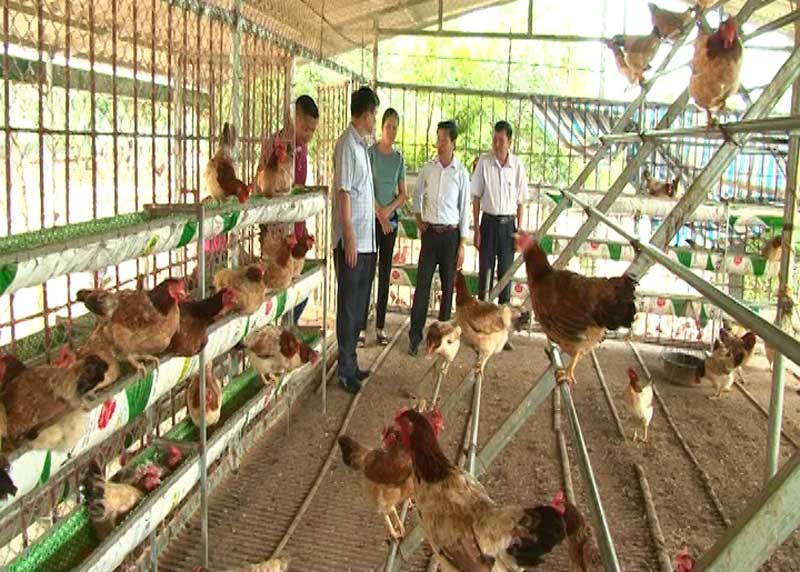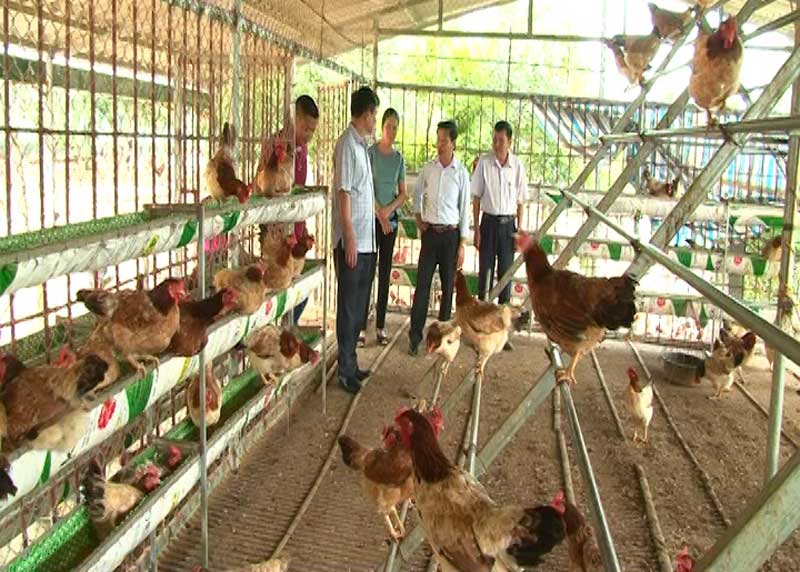
(HBO) - Being a cool climate locality with large garden area, this is considered a golden terrain advantage for Lac Thuy district to develop chicken raising. In order to awaken the potential and build up the brand for Lac Thuy chicken, the party committees, local authorities have promoted the propaganda and mobilized people to develop and expand the scale of production and husbandry according to the process to create delicious chicken products with prestige and high quality.
![]()

The chicken farming model of Mr. Pham Van
Tuan's family, in Phu Thanh commune (Lac Thuy) brings about 600-700 million VND
revenue each year.
At present, Lac Thuy district has over
610,000 chickens raised on farms and family farms concentrated in Phu Thanh, An
Binh, Dong Tam, Phu Lao, Thanh Nong communes and scattered in all communes and
town in the district. In the 11 priority sectors that Lac Thuy proposed in the
restructuring project for agriculture, livestock production is one of the key
priorities. In order to change from the thinking and awareness to the actions
of the people in the development of chicken raising, the Party Committee, the
authorities of Lac Thuy district, communes and towns have many practical and
effective ways such as creating conditions for people to access loans, land area for grazing; connecting with
professional agencies to support people in science and technology, disease
prevention; promoting the potential promotion and quality of Lac Thuy chicken.
So Lac Thuy chicken has been known and bought in many provinces.
For the livestock sector of Lac Thuy
district, in the period 2016-2020, will focus on development, making the
raising livestock become a key part in agricultural production, a breakthrough
in the restructuring of rural economy. They strive to increase the average
production value of the livestock industry by 8.5% per year and by 2020, the
husbandry sector accounts for 26.1% of the agriculture, forestry and fishery
industry. Particularly, Lac Thuy chicken will be developed in the direction of
both concentrated and scattered in the majority of farm households in the way
of intensive farming. Farm-scale breeding is carried out in concentrated
livestock areas as planned. By 2020, the total number of poultry in the district
will be 800,000 animals and 800 tonnes will be produced. The planning area of
integrated breeding of disease safety for raising areas and breeding areas
will be gradually formed.
According to data from the Hoa Binh Provincial Party Committee, the industrial production index for the first six months of 2025 is estimated to have increased by 20% compared to the same period last year. This marks the highest year-on-year growth rate for this period since 2020.
In the first six months of 2025, Hoa Binh province’s export turnover was estimated at 1.145 billion USD, marking an 18.11% increase compared to the same period in 2024. Import turnover was estimated at $ 804 million, a 17.15% increase, which helped the province maintain a positive trade balance.
The lives of the ethnic minority farmers in Tan Lac district have gradually improved thanks to the new directions in agricultural production. This is a testament to the collective strength fostered through the professional associations and groups implemented by various levels of the district’s Farmers’ Union.
With the motto the "product quality comes first,” after nearly one year of establishment and operation, Muong village’s Clean Food Agricultural and Commercial Cooperative, located in Cau Hamlet, Hung Son Commune (Kim Boi district), has launched reputable, high-quality agricultural products to the market that are well-received by consumers. The products such as Muong village’s pork sausage, salt-cured chicken, and salt-cured pork hocks have gradually carved out a place in the market and they are on the path to obtaining the OCOP certification.
In the past, the phrase "bumper harvest, rock-bottom prices" was a familiar refrain for Vietnamese farmers engaged in fragmented, small-scale agriculture. But today, a new spirit is emerging across rural areas of Hoa Binh province - one of collaboration, organisation, and collective economic models that provide a stable foundation for production.
Maintaining growing area codes and packing facility codes in accordance with regulations is a mandatory requirement for agricultural products to be eligible for export. Recently, the Department of Agriculture and Environment of Hoa Binh province has intensified technical supervision of designated farming areas and packing facilities to safeguard the "green passport" that enables its products to access international markets.



